Sept. 5, 2024
Thesaurus : Doctrine
► Référence complète : U. Öberg, "A ‘General’ Court in Name Only", Concurrences, septembre 2024, n° 3, art. n°119581, pp. 2-6
____
► Résumé de l'article :
____
🦉Cet article est accessible en texte intégral pour les personnes inscrites aux enseignements de la Professeure Marie-Anne Frison-Roche
________
July 11, 2024
Thesaurus : Doctrine
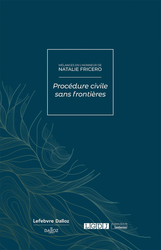
► Référence complète : Mélanges en l'honneur de Natalie Fricero. Procédure civile sans frontières, Dalloz et LGDJ, 2024, 704 p.
____
____
📗lire le sommaire de l'ouvrage
____
► Résumé de l'ouvrage (fait par l'éditeur) : "Il est des matières indissociables de certains noms et des noms indissociables de certaines matières. Tel est le lien unissant la Professeure Natalie Fricero et la procédure civile.
Professeure des universités à la Faculté de droit de l’Université de Nice (Côte d’Azur), directrice de l’Institut d’études judiciaires de cette faculté pendant plus de 20 ans, présidente de la première Commission nationale de l’examen d’entrée aux CRFPA, membre du Conseil supérieur de la magistrature entre 2019 et 2022, membre du Conseil national de la médiation depuis 2023, doyenne du pôle civil de l’École nationale de la magistrature, ambassadrice de l’amiable, Natalie Fricero a une carrière immense, voire vertigineuse. Son apport à la doctrine procédurale contemporaine est unanimement reconnu en France et au-delà des frontières nationales par l’ensemble de ses pairs et des professionnels du droit.
Les frontières, la Professeure Natalie Fricero n’a eu de cesse de les repousser, de s’en affranchir, voire de les abolir. Travaillant de concert avec les professions juridiques, la Professeure Natalie Fricero a fait céder la frontière entre le monde universitaire et celui des praticiens. Disruptive, elle a innové dans ses pratiques pédagogiques et œuvre continuellement à une conception moderne de la procédure civile dont elle a très tôt repoussé les limites pour y intégrer les modes amiables de résolution des différends. Pragmatique, elle a considérablement amélioré la lisibilité de la matière tant pour la communauté académique que pour les professionnels à l'échelle nationale et internationale, grâce à ses nombreux ouvrages, articles, conférences, communications, formations et sa participation décisive au code mondial de l'exécution et au code mondial de l'exécution digitale. Précurseur, elle a su saisir en avance l'influx de l’européanisation de la procédure et des droits de l'Homme, mais aussi les opportunités des nouvelles technologies, dessinant les lignes de la procédure civile de demain.
Par sa générosité, son enthousiasme, son dynamisme et son talent, la Professeure Natalie Fricero continue de marquer des générations d’étudiants, d'inspirer nombre de ses collègues et d’influencer la communauté juridique. En lui consacrant ces Mélanges, ses amis souhaitent la remercier de ce qu’elle apporte à chacun et à la procédure civile ; une discipline qu’elle veut humaniste, généreuse, sans frontières ; une procédure civile à son image.".
____
📝lire une présentation de l'article d'Hervé Croze : "Dieu nous garde du contrôle de proportionnalité"
_________
June 24, 2024
Conferences
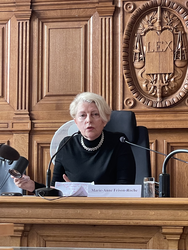
► Full Reference: M.-A. Frison-Roche, "Les deux rencontres entre l'intelligence artificielle et le Contentieux Systémique" ("The two meetings between Artificial Intelligence and Systemic Litigation"), in L’intelligence artificielle, nouveau champ de Contentieux Systémique (Artificial intelligence, new field of Systemic Litigation), in cycle of conferences-debates "Contentieux Systémique Émergent" ("Emerging Systemic Litigation"), organised on the initiative of the Cour d'appel de Paris (Paris Cour of Appeal), with the Cour de cassation (French Court of cassation), the Cour d'appel de Versailles (Versailles Court of Appeal), the École nationale de la magistrature - ENM (French National School for the Judiciary) and the École de formation des barreaux du ressort de la Cour d'appel de Paris - EFB (Paris Bar School), under the scientific direction of Marie-Anne Frison-Roche, June 24, 2024, 11am-12.30pm, Cour d'appel de Paris, Cassin courtroom.
____
🧮see the full programme of this event
____
► English Summary of the conference: In the general presentation on the theme itself, I underlined "The two meetings between Artificial Intelligence and Systemic Litigation".
The focus of this conference is not the state of what is usually called Artificial Intelligence, but rather how to correlate AI and "Emerging Systemic Litigation" (ESL).
This involves recalling what "Systemic Litigation" is (1), then looking at the contribution of Artificial Intelligence to dealing with this type of litigation (2), before considering that the algorithmic system itself can be a subject of Systemic Litigation (3).
1. What is the Systemic Litigation that we see Emerging?
On the very notion of "Emerging Systemic Litigation" (ESL), proposed in 2021, read : M.-A. Frison-Roche, 🚧The Hypothesis of the category of Systemic Cases brought before the Judge, 2021
Emerging Systemic Litigation concerns situations that are brought before the Judge and in which a System is involved. This may involve the banking system, the financial system, the energy system, the digital system, the climate system or the algorithmic system.
In this type of litigation, the interests and future of the system itself are at stake, "in the case". The judge must therefore "take them into consideration"📎
In this respect, "Emerging Systemic Litigation" must be distinguished from "Mass Litigation". "Mass litigation" refers to a large number of similar disputes. The fact that they are often of "low importance" is not necessarily decisive, as these disputes are important for the people involved and the use of A.I. must not overpower the specificity of each one. The fact remains, however, that the criterion for Systemic Litigation is the presence of a system. It may happen that a mass litigation calls into question the very interest of a system (for example, value date litigation), but more often than not the Systemic Litigation we see emerging is, unlike mass litigation, a very specific case in which one party, for example, formulates a very specific claim (e.g., asking for considerable work to be stopped) against a multinational company, and will thus "call into question" an entire value chain and the obligations incumbent on the powerful company to safeguard the climate system, which is therefore present in the proceedings (which does not, however, entitle it to make claims, but which must be taken into consideration).
2. The contribution of Algorithmic Power in the conduct of a Systemic Litigation
In this respect, AI can be a useful, if not indispensable, tool for mastering such Systemic Litigation, the emergence of which corresponds to a novelty, and the knowledge of which is brought before the Ordinary Law Judge.
Indeed, this type of litigation is particularly complex and time-consuming, with evidentiary issues at the heart of the case, and with expert appraisal following on from expert appraisal. Expert appraisals are difficult to carry out. AI can therefore be a means for the judge to control the expert dimension of Systemic Litigation, in order to curb the increased risk of experts capturing the judge's decision-making power.
The choice of AI techniques presents the same difficulties as those that have always applied to experts. It is likely that certification mechanisms, analogous to registration on expert lists, will be put in place, if we move away from construction by the courts themselves (or by the government, which may pose a problem for the independence of the judiciary), or if we want control over tools provided by the parties themselves, with regard to the principle of equality of arms due to the cost of these tools.
3. When it is the Algorithmic System itself that is the subject of a Systemic Litigation: its place is then rather in defense
Moreover, the algorithmic system itself gives rise to Systemic Litigation, in that individuals may bring a case before the courts claiming to have suffered damage as a result of the algorithmic system's operation, or seeking enforcement of a contract drawn up by the system. It is in the realm of the Ordinary Contract and Tort Law that the system may find itself involved in the jurisdictional proceedings.
It is noteworthy that, compared with the hypotheses hitherto favored in previous conference-debates, notably those of April 26, 2024 on Emerging Systemic Litigation linked to the Duty of Vigilance📎
However, the instance changes if the system is no longer presented as the potential "victim" but rather as the potential "culprit". In particular, it is much less clear what type of intervener in the proceedings, who is not necessarily a party to the dispute, should speak to explain the system's interest, particularly with regard to the sustainability and future of the AI system.
This is an area for further consideration by heads of courts.
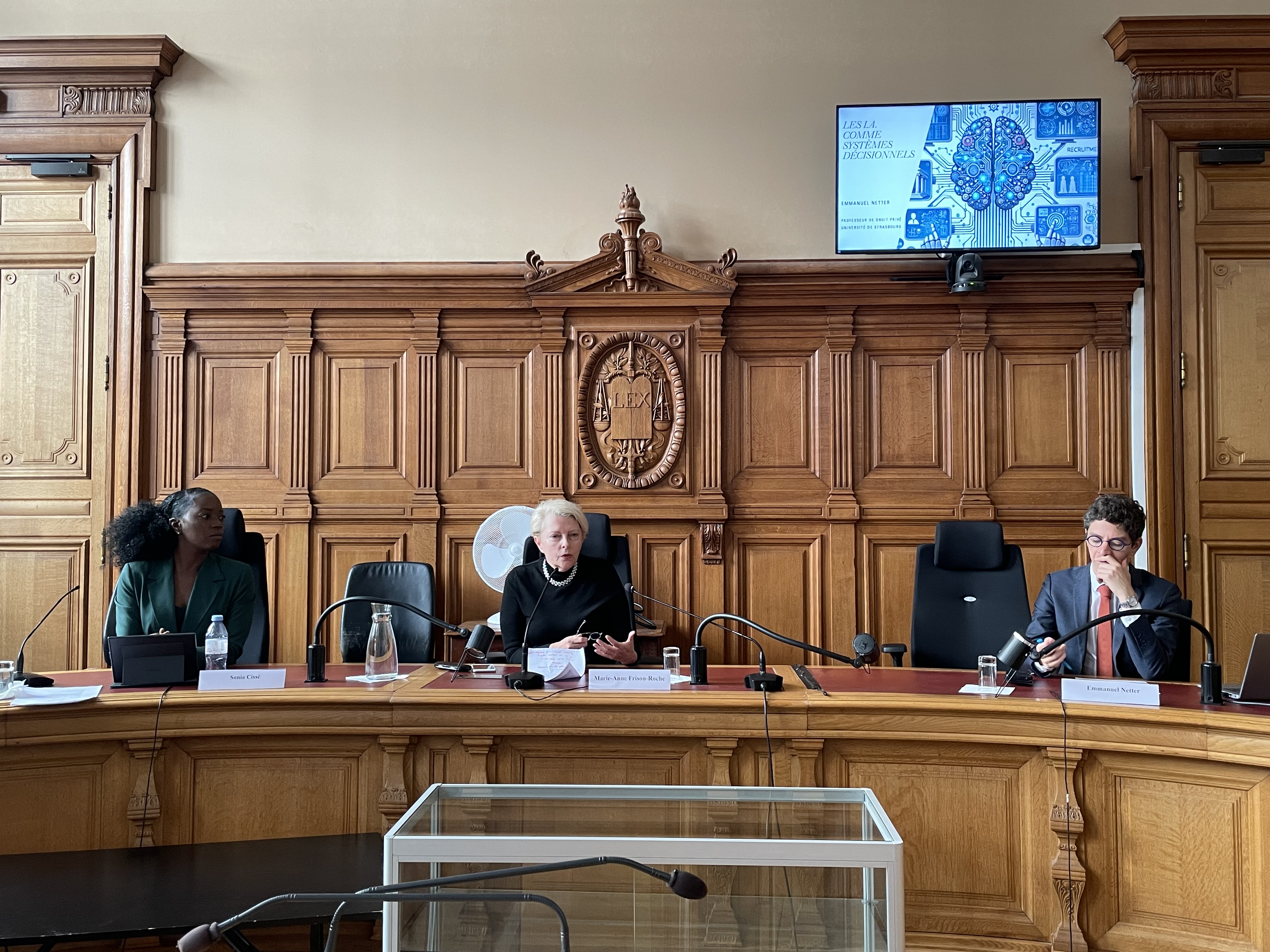
________
🕴️Fr. Ancel, 📝Compliance Law, a new guiding principle for the Trial?, in 🕴️M.-A. Frison-Roche (ed.), 📘Compliance Jurisdictionalisation, 2024.
🧮La vigilance, nouveau champ de contentieux systémique (Vigilance, new field of Systemic Litigation), in cycle of conference-debates "Contentieux Systémique Émergent" ("Emerging Systemic Litigation"), organised on the initiative of the Cour d'appel de Paris (Paris Cour of Appeal), with the Cour de cassation (French Court of cassation), the Cour d'appel de Versailles (Versailles Court of Appeal), the École nationale de la magistrature - ENM (French National School for the Judiciary) and the École de formation des barreaux du ressort de la Cour d'appel de Paris - EFB (Paris Bar School), under the scientific direction of Marie-Anne Frison-Roche, June 24, 2024.
June 18, 2024
Thesaurus : 08. Juridictions du fond
► Référence complète : Cour d'appel de Paris, Pôle 5, Chambre 12, 18 juin 2024, n° RG 23/10583, Suez
____
____
🏛️consulter une présentation de l'arrêt rendu le même jour dans l'affaire dite TotalEnergies
____
🏛️consulter une présentation de l'arrêt rendu le même jour dans l'affaire dite EDF
____
📰lire le communiqué de presse accompagnant le prononcé de ces trois arrêts
____
📝Commentaires de cette décision :
- Rev. int. compliance, n°4, 30 juillet 2024, act. 135
________
June 18, 2024
Thesaurus : 08. Juridictions du fond
► Référence complète : Cour d'appel de Paris, Pôle 5, Chambre 12, 18 juin 2024, n° RG 21/22319, EDF
____
____
🏛️consulter une présentation de l'arrêt rendu le même jour dans l'affaire dite TotalEnergies
____
🏛️consulter une présentation de l'arrêt rendu le même jour dans l'affaire dite Suez
____
📰lire le communiqué de presse accompagnant le prononcé de ces trois arrêts
____
📝Commentaires de cette décision :
- Rev. int. compliance, n°4, 30 juillet 2024, act. 135
________
June 18, 2024
Thesaurus : 08. Juridictions du fond
► Référence complète : Cour d'appel de Paris, Pôle 5, Chambre 12, 18 juin 2024, n° RG 23/14348, TotalEnergies
____
____
🏛️consulter une présentation de l'arrêt rendu le même jour dans l'affaire dite Suez
____
🏛️consulter une présentation de l'arrêt rendu le même jour dans l'affaire dite EDF
____
📰lire le communiqué de presse accompagnant le prononcé de ces trois arrêts
____
📝Commentaires de cette décision :
- Rev. int. compliance, n°4, 30 juillet 2024, act. 135
________
June 11, 2024
Thesaurus : Doctrine
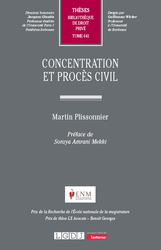
► Référence complète : M. Plissonnier, Concentration et procès civil, préf. S. Amrani Mekki, LGDJ, coll. "Bibliothèque de droit privé", t. 641, 2024, 688 p.
____
📗lire la 4ième de couverture
____
📗lire le sommaire de l'ouvrage
____
📗lire la table des matières de l'ouvrage
____
► lire le résumé de la thèse, publié sur le site de l'ENM
____
► Résumé de l'ouvrage (fait par l'éditeur) : "Le 7 juillet 2006, dans une décision Cesareo restée célèbre, l’Assemblée plénière de la Cour de cassation a décidé qu’il incombait aux parties de « présenter dès l’instance relative à la première demande l’ensemble des moyens […] de nature à fonder celle-ci ».
Souvent décrit comme révolutionnaire, cet arrêt a consacré une forme de contrainte pourtant connue dans le procès civil français et en droit comparé : une concentration des moyens.
Depuis une vingtaine d’années, le type de contrainte procédurale que constitue la concentration est de plus en plus utilisé à la faveur des mouvements de fond qui traversent la procédure civile (crise de la justice, crise du temps). La question se pose dès lors de savoir quel sens donner à la concentration dans le procès, car elle demeure relativement méconnue, et quelle influence elle exerce sur lui.
Partant des différentes concentrations existantes et des utilités qu’elles poursuivent, la thèse tente d’abord de systématiser une notion de concentration en construisant sa définition et la désignant pour ce qu’elle est : un type de charge du procès.
Quant à ses effets sur le procès, la thèse soutient que la concentration joue un rôle qui est excessif, tant sur le rôle des parties et du juge, supposés équilibrés, que sur le déroulement du procès, supposé s’inscrire dans le temps. Pour autant, la concentration n’est pas à bannir. Plusieurs remèdes sont proposés pour adapter ou équilibrer la concentration en vue de parvenir à son usage maîtrisé.".
_________
June 5, 2024
Thesaurus : Doctrine

► Référence complète : H. Kassoul (dir.), Le choix des juges. Les Rencontres de Thémis et Sophia (3e édition), LexisNexis, 2024, 263 p.
____
____
📗lire le sommaire de l'ouvrage
____
📗lire la table des matières de l'ouvrage
____
►Résumé de l'ouvrage (fait par l'éditeur) : "Le thème du "choix des juges" invite à cheminer sur la crête du processus décisionnel, à penser des sujets relatifs tant à la procédure qu’à l’administration de la justice, à explorer le modèle du "bon juge", à peser le "bon" ou le "mauvais" choix, à réfléchir aux limites de l’office du juge, mais aussi, plus largement, à penser le face-à-face entre la justice et la cité.
Se posent ainsi, d’une part, la question du mode de désignation des juges, et, d’autre part, celle du juge au travail. En d’autres termes, il aura fallu se demander "comment choisir les juges ?" et "comment les juges font-ils des choix ?".
Les Rencontres de Thémis et Sophia auront contribué à éclairer ce sujet d’un point de vue juridique et philosophique, en épousant une démarche pluridisciplinaire.".
________
April 9, 2024
Thesaurus : 05.1. CEDH
► Référence complète : CEDH, Grande chambre, 9 avril 2024, n°53600/20, Verein Klimaseniorinnen Schweiz et a. c/ Suisse
____
________
April 4, 2024
Thesaurus : Doctrine
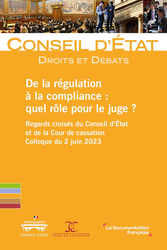
► Référence complète : F. Ancel, "Quel rôle pour le juge aujourd’hui dans la compliance ? Quel office processuel du juge dans la compliance ?", in Conseil d'État et Cour de cassation, De la régulation à la compliance : quel rôle pour le juge ? Regards croisés du Conseil d'Etat et de la Cour de cassation - Colloque du 2 juin 2023, La Documentation française, coll. "Droits et Débats", 2024, pp. 101-119
____
► Résumé de l'article :
________

March 29, 2024
Organization of scientific events
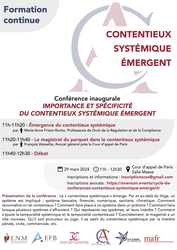
► Full Reference: Importance et spécificité du Contentieux Systémique Émergent (Importance and specificity of the Emerging Systemic Litigation), in cycle of conference-debates "Contentieux Systémique Émergent" ("Emerging Systemic Litigation"), organised on the initiative of the Cour d'appel de Paris (Paris Cour of Appeal), with the Cour de cassation (French Court of cassation), the Cour d'appel de Versailles (Versailles Court of Appeal), the École nationale de la magistrature - ENM (French National School for the Judiciary) and the École de formation des barreaux du ressort de la Cour d'appel de Paris - EFB (Paris Bar School), under the scientific direction of Marie-Anne Frison-Roche, March 29, 2024, 11h-12h30, Cour d'appel de Paris, Masse room
____
► Presentation of the conference-debate: The "Systemic Litigation" is emerging. Through and beyond the dispute, a system is involved: the banking, financial, digital, health and climate systems. How can such litigation be recognised? How do you make room for a system in a court of law? What can be done when several systems are in conflict? Who represents these systems and their interests? How can the temporality of systems and litigation be reconciled? In practical terms, the magistrate has a new role. Whether they are prosecutors or judges, they deal with systemic litigation in criminal, civil, commercial and other areas.
____
🎤see the detailed presentation of the first speech of 🕴️Marie-Anne Frison-Roche : L'émergence du Contentieux Systémique (The Emergence of Systemic Litigation)
____
🧮Programme of this event:
Inaugural Conference
IMPORTANCE ET SPÉCIFICITÉ DU CONTENTIEUX SYSTÉMIQUE ÉMERGENT
(IMPORTANCE AND SPECIFICITY OF THE EMERGING SYSTEMIC LITIGATION)
Cour d’appel de Paris (Paris Court of Appeal), Masse room
🕰️11h-11h20. 🎤L’émergence du contentieux systémique (The Emergence of the Systemic Litigation), by 🕴️Marie-Anne Frison-Roche, Professor of Regulatory and Compliance Law, Director if the Journal of Regulation & Compliance (JoRC)
🕰️11h20-11h40. 🎤L’office du magistrat du parquet dans le contentieux systémique (The role of the Public Prosecutor in Systemic Litigation), by 🕴️François Vaissette, Avocat général près la Cour d’appel de Paris (Advocate General at the Paris Court of Appeal)
🕰️11h40-12h30. Debate
____
🔴Registrations and information requests can be sent to: inscriptionscse@gmail.com
🔴For the attorneys, registrations have to be sent to the following address: https://evenium.events/cycle-de-conferences-contentieux-systemique-emergent/
⚠️The conference-debates are held in person only, in the Cour d’appel de Paris (Paris Court of Appeal).
____
🧮Read below a detailed presentation of this event⤵️
________
March 28, 2024
Interviews

🌐follow Marie-Anne Frison-Roche on LinkedIn
🌐subscribe to the Newsletter MAFR Regulation, Compliance, Law
____
► Full Reference: M.-A. Frison-Roche, ""Nous voyons émerger aujourd’hui le contentieux systémique"" (""We are now seeing the emergence of the Systemic Litigation""), interview with Olivia Dufour, counterpoint to the interview with the Premier Président de la Cour d'appel de Paris (First President of the Paris Court of Appeal) Jacques Boulard, "Contentieux systémique : "Il est important, pour les magistrats, de rester au plus près des réalités"" ("Systemic litigation: "It is important for judges to remain as close as possible to reality""), Actu-Juridique, March 28, 2024
____
💬read the interview (in French)
____
This interview is a counterpoint to the interview conducted with Jacques Boulard, Premier Président de la Cour d'appel de Paris (First President of the Paris Court of Appeal), on the Court of Appeal's threefold initiative in establishing the Conseil de Justice Économique - CJE (Economic Justice Council), the additional chamber (5-12) to hear vigilance litigation in particular and the setting up of the series of conference-debates on the Contentieux Systémique Émergent (Emerging Systemic Litigation): read the interview (in French).
This interview highlights Marie-Anne Frison-Roche's position at the Conseil de Justice Économique and her role as scientific director of the series of conference-debates.
As a counterpoint, the journal conducts a specific interview with Marie-Anne Frison-Roche on the specific issue of the Contentieux Systémique Émergent (Emerging Systemic Litigation) cycle.
____
► Presentation of the interview by the journal : "Marie-Anne Frison-Roche, professeur de droit de la régulation et de la compliance et responsable scientifique du cycle « Contentieux systémique émergent » nous explique la notion de contentieux systémique et l’importance de la démarche engagée par le Premier président."
(Free translation : "Marie-Anne Frison-Roche, Professor of Regulatory Law and Compliance Law and Scientific Director of the "Contentieux systémique émergent" ("Emerging Systemic Litigation") cycle, explains the concept of Systemic Litigation and the importance of the approach adopted by the First President.")
____
For the record, the 2024 conference-debates of the "Contentieux systémique émergent" ("Emerging Systemic Litigation") cycle:
- Conférence inaugurale – Vendredi 29 mars 2024, de 11h à 12h30, IMPORTANCE ET SPÉCIFICITÉ DU CONTENTIEUX SYSTÉMIQUE ÉMERGENT
- Deuxième conférence – Vendredi 26 avril 2024, de 11h à 12h30, LA VIGILANCE, NOUVEAU CHAMP DE CONTENTIEUX SYSTÉMIQUE
- Troisième conférence – Lundi 27 mai 2024, de 11h à 12h30, LES TECHNIQUES DE SUPERVISION DES CONTENUS NUMÉRIQUES DISPONIBLES SUR LES PLATEFORMES
- Quatrième conférence – Lundi 24 juin 2024, de 11h à 12h30, L’INTELLIGENCE ARTIFICIELLE, NOUVEAU CHAMP DE CONTENTIEUX SYSTÉMIQUE
- Cinquième conférence – Lundi 9 septembre 2024, de 11h à 12h30, LA PORTÉE DES NORMES DE DROIT DUR, DE DROIT SOUPLE ET DES NORMES TECHNIQUES DANS LE CONTENTIEUX SYSTÉMIQUE ÉMERGENT
- Sixième conférence – Lundi 14 octobre 2024, de 11h à 12h30, LES TECHNIQUES PROBATOIRES ADÉQUATES DANS LE CONTENTIEUX SYSTÉMIQUE ÉMERGENT
- Septième conférence – Lundi 18 novembre 2024, de 11h à 12h30, DISCUSSION OUVERTE
- Conférence de clôture de l’année 2024 – Lundi 16 décembre 2024, de 16h à 18h, L’EXPÉRIENCE DES JURIDICTIONS DANS LE CONTENTIEUX SYSTÉMIQUE ÉMERGENT
____
► For the record, presentation of the interview of the Premier Président (First President) by the journal (in French): "Vendredi 29 mars aura lieu la première conférence-débat du cycle de formation « Contentieux systémique émergent » à la Cour d’appel de Paris. Cette initiative s’inscrit dans le cadre d’une politique qui a menée à la création d’un Conseil de justice économique ainsi qu’à la mise en place d’une nouvelle chambre dédiée au devoir de vigilance et à la responsabilité écologique. Le Premier président de la Cour d’appel de Paris, Jacques Boulard, nous explique les objectifs et les enjeux de ces innovations.".
____
________
Feb. 29, 2024
Editorial responsibilities : Direction of the collection "Regulations & Compliance", JoRC & Dalloz
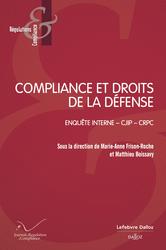
🌐follow Marie-Anne Frison-Roche on LinkedIn
🌐subscribe to the Newsletter MAFR Regulation, Compliance, Law
____
► Full Reference: M.-A. Frison-Roche & M. Boissavy (eds.), Compliance et droits de la défense. Enquête interne – CJIP – CRPC (Compliance and rights of the defence. Internal investigation – French Judicial Public Interest Agreement – French guilty plea procedure), Journal of Regulation & Compliance (JoRC) and Dalloz, "Régulations & Compliance" Serie, 2024, 362 p.
____
► General presentation of the book: We do not have an overall view of the relationship between Compliance and the rights of the defence in the continuum of internal investigations and DPA, or in the French legal system the convention judiciaire d'intérêt public (CJIP) and the comparution immédiate avec reconnaissance de culpabilité (CRPC), in particular because the texts, whether hard law or soft law, decisions and academic analyses segment them, making it difficult to build a pertinent appreciation of each one. This is made all the more difficult by the fact that we know little about how each of them is applied in practice, both within each of them and in relation to each other. As a result, it is difficult to express overall satisfaction, or total rejection, or to suggest some specific reforms and to precise on what points, to identify the appropriate source of these improvements, legislation, case law, professions, or spontaneous ways of doing. The first ambition of this book is therefore to restore an overall vision, because this is the vision of practice. If shortcomings are found to exist, then they can be more easily denounced.
However, some of the situations described may be described as flawed, or even dramatic, by some, while others may consider that they should be approved as they stand. This applies, for example, to the question of whether or not the investigation report should be secret from the prosecuting authority, which may propose a DPA (or in the French legal system a CJIP), whether or not this CJIP should be extended to individuals, whether or not a lawyer should be present from the internal investigation stage onwards, whether or not the lawyer should support the interests of the company he/she is investigating and continue to do so before the regulator or the prosecutor, whether or not the investigation is delegated from the public authorities to the company, whether or not the lawyer-investigator and then the lawyer-defendant are both lawyers, whether or not the victims are represented in the the CIPC process, etc. Depending on what one thinks the relation between Compliance and due process should be in principle and in practice, one expresses a more or less approving or severe judgement on the state of the texts, the soft law nature of most of them making the exercise complicated, and then if there is a gap between them and what one thinks should be the right standard, one asserts that in practice things happen differently from what the texts say, or one considers that the texts should be changed. From point to point, a veritable kaleidoscope emerges in this book.
Indeed, the result is a series of contributions that sometimes clash with one another, with a sort of contradictionary principle creeping into the very structure of this book, thus establishing the readesr as a sort of judges themselves , that character who is so absent. He/she will be able to do so, since the book lists texts, describes practices and gives an illustration of everything that can be thought of, in visions that are sometimes analytical and sometimes global, with proposals of reforms of texts, jurisprudence or conduct.
The aim of the book is to enable readers to form their own opinions and to take part in what is undoubtedly being strongly debated today: the confrontation between Compliance and rights of the defence.
____
🧮this book follows a conference organised by the Conseil national des barreaux - CNB (French National Council of Lawyers), which took place on 20 and 21 April 2023: Avocats et droits de la défense dans les enquêtes internes et la justice négociée.
____
This volume is the continuation of the books dedicated to Compliance in this collection.
📚 Read the presentations of the other books on Compliance in this collection:
- further books:
🕴️M.-A. Frison-Roche (ed.), 📕Le système probatoire de la compliance, 2025
🕴️M.-A. Frison-Roche (ed.), 📕Compliance et contrat, 2024
🕴️M.-A. Frison-Roche (ed.), 📕L'Obligation de Compliance, 2024
- previous books:
🕴️M.-A. Frison-Roche (dir.), 📕La juridictionnalisation de la Compliance, 2023
🕴️M.-A. Frison-Roche (ed.), 📕Les Buts Monumentaux de la Compliance, 2022
🕴️M.-A. Frison-Roche (ed.), 📕Les outils de la Compliance, 2021
🕴️M.-A. Frison-Roche (ed.), 📕Pour une Europe de la Compliance, 2019
🕴️N. Borga, N., 🕴️J.-Cl. Marin & 🕴️J.-Ch. Roda (eds.), 📕Compliance : Entreprise, Régulateur, Juge, 2018
🕴️M.-A. Frison-Roche (ed.), 📕Régulation, Supervision, Compliance, 2017
🕴️M.-A. Frison-Roche (ed.), 📕Internet, espace d'interrégulation, 2016
📚Read the presentations of the other titles of the collection.
____
► Summary of the book: The rights of the defence are one of the pillars of our Rule of Law. On the face of it, compliance techniques are not concerned with this under the pretext of efficiency. This would be particularly true in a trilogy that unfolds over time: internal investigation, convention judiciaire d'intérêt public - CJIP (French Judicial Public Interest Agreement) and comparution sur reconnaissance préalable de culpabilité - CRPC (French guilty plea procedure).
However, because Compliance Law is also the expression of the Rule of Law, in that its ambition is to detect and prevent systemic risks in order to protect present and future human beings, we must go beyond this opposition and articulate Compliance and rights of the defence.
The Monumental Goals of Compliance, which justify its power, for example to obtain information, and the fundamental rights of the defence, which for example impose the presumption of innocence, must be adjusted to each other; by interpreting texts, or even adopting new ones.
The book analyses each of these three techniques, in particular the still largely unregulated internal investigation, and sheds light on them in relation to each other, in order to formulate proposals.
____
🏗️General construction of the book: The book opens with an overview divided into three sections. The first Title compares the challenges of the internal investigation with the rights of the defence. The second Title compares the issues at stake in the convention judiciaire d'intérêt public - CJIP (French Judicial Public Interest Agreement) and the comparution sur reconnaissance préalable de culpabilité - CRPC (French guilty plea procedure) with these same rights of the defence.
____
TABLE OF CONTENTS
COMPLIANCE ET DROITS DE LA DÉFENSE : VISION D'ENSEMBLE
(COMPLIANCE AND RIGHTS OF THE DEFENCE : OVERVIEW)
Section 2 ♦️ Compliance et droits de la défense : toujours pour le respect des droits humains (Compliance and rights of the defence: always for the respect of human rights), by🕴️Matthieu Boissavy
Section 3 ♦️ Circuler dans le temps pour mettre en phase Compliance et droits de la défense (Moving through Time to align Compliance and rights of the defence), by🕴️Marie-Anne Frison-Roche
TITRE I.
LES ENJEUX PROCÉDURAUX DE L'ENQUETE INTERNE CONFRONTÉE AUX DROITS DE LA DÉFENSE
(TITLE I.
PROCEDURAL CHALLENGES OF THE INTERNAL INVESTIGATION
IN RELATION TO THE RIGHTS OF THE DEFENCE)
CHAPITRE I : VISION GÉNÉRALE DES DROITS DE LA DÉFENSE DANS L'ENQUÊTE INTERNE
(CHAPTER I: OVERVIEW OF THE RIGHTS OF THE DEFENCE IN INTERNAL INVESTIGATION)
Section 1 ♦️ Approche doctrinale de l’enquête interne et de l’enquête pénale privée (Doctrinal approach to internal investigation and private criminal investigation), by 🕴️Benjamin Fiorini
Section 2 ♦️ Regard critique : La place des droits de la défense dans l'enquête interne selon le guide AFA/PNF (A critical look: The place of the rights of the defence in the internal investigation according to the AFA/PNF Guide), by 🕴️Margaux Durand-Poincloux, 🕴️David Apelbaum and 🕴️Paola Sardi-Antasan
CHAPITRE II : LES DROITS DE LA DÉFENSE À CHAQUE ÉTAPE DE L'ENQUÊTE INTERNE
(CHAPTER II: THE RIGHTS OF THE DEFENCE AT EACH STAGE OF THE INTERNAL INVESTIGATION)
Section 1 ♦️ La réception des alertes par l'avocat (Reception of alerts by the lawyer), by🕴️Maria Lancri
Section 2 ♦️ Collecte et traitement des informations dans les enquêtes internes à l'ère numérique : processus et enjeux (Collecting and processing information for internal investigations in the digital age: processes and challenges), by🕴️Uriel Goldberg
Section 3 ♦️ L’apport de la psychologie pour l'effectivité des droits de la défense dans l'enquête interne pour harcèlement au travail (The contribution of psychology to the effectiveness of the rights of the defence in internal investigation for harassment in the workplace), by🕴️Nathalie Leroy & 🕴️Danièle Zucker
Section 4 ♦️ Le respect des droits de la défense lors des auditions des enquêtes internes : un gage d’efficacité (Respecting the rights of the defence during hearings in internal investigations: a guarantee of efficacy), by 🕴️Emmanuel Daoud & 🕴️Ghita Khalid Rouissi
Section 5 ♦️ L’enquête interne au cœur des enjeux de conformité et de justice négociée : analyse de la position de l'AFA et du PNF (The internal investigation at the heart of conformity and negotiated justice issues: analysis of the position of the AFA and the PNF), by🕴️Éric Russo
Section 6 ♦️ Le rapport d’enquête interne à l’épreuve des droits de la défense (The internal investigation report put to the test of defence rights), by🕴️Samuel Sauphanor
CHAPITRE III : LA SPÉCIFICITÉ DES ENQUÊTES INTERNES DANS LES ENTREPRISES INTERNATIONALES ET LA PLACE DES DROITS DE LA DÉFENSE
(CHAPTER III : SPECIFICITY OF INTERNAL INVESTIGATIONS IN INTERNATIONAL COMPANIES AND THE PLACE OF THE RIGHTS OF THE DEFENCE)
Section 1 ♦️ La spécificité des enquêtes internes pratiquées par les groupes internationaux (Specificity of internal investigations carried out by international groups), by 🕴️Olivier Catherine
Section 2 ♦️ Garantir la valeur probatoire d’un rapport dans le cadre d’une enquête interne opérée dans une entreprise internationale (Guaranteeing the evidential value of a report in an internal investigation carried out in an international company), by 🕴️Monique Figueiredo
Section 3 ♦️ La responsabilité de l'entreprise dans la conception et la menée de l'enquête interne (The company's responsibility in designing and conducting an internal investigation), by 🕴️Lydia Meziani
Section 4 ♦️ Enquêtes internes, enquêtes pénales et droits de la défense : que nous disent les jurisprudences américaine et anglaise (l’affaire Connolly et l’affaire ENRC) ? (Internal investigations, criminal investigations and rights of the defence: what do the US and UK case law tell us (the Connolly case and the ENRC case)?), by 🕴️Victoire Chatelin
CHAPITRE IV : LE RÔLE SINGULIER DE L'AVOCAT DANS L'ENQUÊTE INTERNE
(CHAPTER IV: THE SPECIAL ROLE OF THE LAWYER IN THE INTERNAL INVESTIGATION)
Section 1 ♦️ La méthodologie propre à l'avocat enquêteur (The investigating lawyer's own methodology), by 🕴️William Feugère
Section 2 ♦️ L'enquête interne façonnée par la déontologie de l'avocat (The internal investigation shaped by the lawyer's deontology), by 🕴️Stéphane De Navacelle, 🕴️Julie Zorrila and 🕴️Laura Ragazzi
Section 3 ♦️ Préserver le secret professionnel de l'avocat dans l'enquête interne et son résultat (Preserving the lawyer's professional secrecy in the internal investigation and its outcome), by 🕴️Bénédicte Graulle & 🕴️Yanis Rahim
Section 4 ♦️ L’avocat-enquêteur en droit du travail : un janséniste au milieu du Far West (The lawyer-investigator in employment law: a Jansenist in the Wild West), by 🕴️Richard Doudet
Section 5 ♦️ La défense des personnes physiques dans les enquêtes internes (Defending individuals in internal investigations), by 🕴️Dorothée Hever
TITRE II.
LES ENJEUX PROCÉDURAUX DE LA CJIP ET DE LA CRPC
CONFRONTÉES AUX DROITS DE LA DÉFENSE
(TITLE II.
PROCEDURAL CHALLENGES OF THE FRENCH JUDICIAL PUBLIC INTEREST AGREEMENT
AND THE FRENCH GUILTY PLEA PROCEDURE
IN RELATION TO THE RIGHTS OF THE DEFENCE)
CHAPITRE I : VISION GÉNÉRALE DES DROITS DE LA DÉFENSE DANS LA CJIP ET LA CRPC
(CHAPTER I: OVERVIEW OF THE RIGHTS OF THE DEFENCE IN THE FRENCH JUDICIAL PUBLIC INTEREST AGREEMENT AND THE FRENCH GUILTY PLEA PROCEDURE)
Section 1 ♦️ Théorie et pratique de la négociation dans la justice pénale (Theory and practice of negotiation in criminal justice), by 🕴️Sarah-Marie Cabon
Section 2 ♦️ La lutte anti-corruption : l’emprunt au modèle américain et à ses récentes évolutions (The fight against corruption: borrowing from the American model and its recent developments), by 🕴️Stephen L. Dreyfuss
Section 3 ♦️ Justice pénale négociée : avantages présents, risques à venir (Negotiated criminal justice: curent benefits, future risks), by 🕴️Alexis Bavitot
CHAPITRE II : FORMES ACTIVES DES DROITS DE LA DÉFENSE, LES DIALOGUES À L'OEUVRE OU À PARFAIRE DANS LA CJIP ET LA CRPC
(CHAPTER II: ACTIVE FORMS OF THE RIGHTS OF THE DEFENCE, DIALOGUES AT WORK OR TO BE PERFECTED IN THE FRENCH JUDICIAL PUBLIC INTEREST AGREEMENT AND THE FRENCH GUILTY PLEA PROCEDURE)
Section 1 ♦️ Combinaison des CRPC et des CJIP : le cas particulier des affaires de fraude fiscale (Combination of the French guilty plea procedure and the French Judicial Public Interest Agreement: the special issue of tax fraud cases), by 🕴️Marion David
Section 2 ♦️ Pour une justice pénale négociée plus équitable (For a fairer negotiated criminal justice), by🕴️Astrid Mignon Colombet
Section 3 ♦️ Les impacts, sur les droits de la défense, des disparités de la justice pénale négociée dans l’Union européenne (The impact on the rights of the defence of the disparities in negotiated criminal justice in the European Union), by 🕴️Emmanuel Moyne
Section 4 ♦️ L'évolution des rapports entre avocats et autorités de poursuites depuis l'introduction de la CJIP (Developments in relations between lawyers and prosecuting authorities since the introduction of the French Judicial Public Interest Agreement), by 🕴️Thomas Baudesson
CHAPITRE III : LE RÔLE SINGULIER DE L'AVOCAT DANS LA CJIP ET LA CRPC
(CHAPTER III: THE SINGULAR ROLE OF THE LAWYER IN THE FRENCH JUDICIAL PUBLIC INTEREST AGREEMENT AND THE FRENCH GUILTY PLEA PROCEDURE)
Section 1 ♦️ Quand se justifie et quand s'arrête la collaboration ? À propos de la CJIP (When is collaboration justified and when does it end? About the French Judicial Public Interest Agreement), by 🕴️Philippe Goossens
Section 2 ♦️ Le dialogue de l’avocat et de son client, chef d’entreprise, face à la proposition d’une CRPC et d’une CJIP (The dialogue between the lawyer and his client, a company director, faced with the proposal of a French guilty plea procedure or a French Judicial Public Interest Agreement), by 🕴️François Saint-Pierre
Section 3 ♦️ Le dilemme de l'avocat pénaliste face à la CRPC (The criminal lawyer's dilemma when faced with the French guilty plea procedure), by 🕴️Jean Boudot
Section 5 ♦️ Défendre les intérêts des victimes dans la justice pénale économique négociée (Defending victims' interests in negotiated economic criminal justice), by 🕴️Jérôme Karsenti
________
Feb. 29, 2024
Publications

🌐follow Marie-Anne Frison-Roche on LinkedIn
🌐subscribe to the Newsletter MAFR Regulation, Compliance, Law
____
► Full Reference: M.-A. Frison-Roche & M. Boissavy (eds.), Compliance et droits de la défense. Enquête interne – CJIP – CRPC (Compliance and rights of the defence. Internal investigation – French Judicial Public Interest Agreement – French guilty plea procedure), Journal of Regulation & Compliance (JoRC) and Dalloz, "Régulations & Compliance" Serie, 2024, 362 p.
____
► General presentation of the book: We do not have an overall view of the relationship between Compliance and the rights of the defence in the continuum of internal investigations and DPA, or in the French legal system the convention judiciaire d'intérêt public (CJIP) and the comparution immédiate avec reconnaissance de culpabilité (CRPC), in particular because the texts, whether hard law or soft law, decisions and academic analyses segment them, making it difficult to build a pertinent appreciation of each one. This is made all the more difficult by the fact that we know little about how each of them is applied in practice, both within each of them and in relation to each other. As a result, it is difficult to express overall satisfaction, or total rejection, or to suggest some specific reforms and to precise on what points, to identify the appropriate source of these improvements, legislation, case law, professions, or spontaneous ways of doing. The first ambition of this book is therefore to restore an overall vision, because this is the vision of practice. If shortcomings are found to exist, then they can be more easily denounced.
However, some of the situations described may be described as flawed, or even dramatic, by some, while others may consider that they should be approved as they stand. This applies, for example, to the question of whether or not the investigation report should be secret from the prosecuting authority, which may propose a DPA (or in the French legal system a CJIP), whether or not this CJIP should be extended to individuals, whether or not a lawyer should be present from the internal investigation stage onwards, whether or not the lawyer should support the interests of the company he/she is investigating and continue to do so before the regulator or the prosecutor, whether or not the investigation is delegated from the public authorities to the company, whether or not the lawyer-investigator and then the lawyer-defendant are both lawyers, whether or not the victims are represented in the the CIPC process, etc. Depending on what one thinks the relation between Compliance and due process should be in principle and in practice, one expresses a more or less approving or severe judgement on the state of the texts, the soft law nature of most of them making the exercise complicated, and then if there is a gap between them and what one thinks should be the right standard, one asserts that in practice things happen differently from what the texts say, or one considers that the texts should be changed. From point to point, a veritable kaleidoscope emerges in this book.
Indeed, the result is a series of contributions that sometimes clash with one another, with a sort of contradictionary principle creeping into the very structure of this book, thus establishing the readesr as a sort of judges themselves , that character who is so absent. He/she will be able to do so, since the book lists texts, describes practices and gives an illustration of everything that can be thought of, in visions that are sometimes analytical and sometimes global, with proposals of reforms of texts, jurisprudence or conduct.
The aim of the book is to enable readers to form their own opinions and to take part in what is undoubtedly being strongly debated today: the confrontation between Compliance and rights of the defence.
____
► Summary of the book: The rights of the defence are one of the pillars of our Rule of Law. On the face of it, compliance techniques are not concerned with this under the pretext of efficiency. This would be particularly true in a trilogy that unfolds over time: internal investigation, convention judiciaire d'intérêt public - CJIP (French Judicial Public Interest Agreement) and comparution sur reconnaissance préalable de culpabilité - CRPC (French guilty plea procedure).
However, because Compliance Law is also the expression of the Rule of Law, in that its ambition is to detect and prevent systemic risks in order to protect present and future human beings, we must go beyond this opposition and articulate Compliance and rights of the defence.
The Monumental Goals of Compliance, which justify its power, for example to obtain information, and the fundamental rights of the defence, which for example impose the presumption of innocence, must be adjusted to each other; by interpreting texts, or even adopting new ones.
The book analyses each of these three techniques, in particular the still largely unregulated internal investigation, and sheds light on them in relation to each other, in order to formulate proposals.
____
🏗️General construction of the book: The book opens with an overview divided into three sections. The first Title compares the challenges of the internal investigation with the rights of the defence. The second Title compares the issues at stake in the convention judiciaire d'intérêt public - CJIP (French Judicial Public Interest Agreement) and the comparution sur reconnaissance préalable de culpabilité - CRPC (French guilty plea procedure) with these same rights of the defence.
____
TABLE OF CONTENTS
COMPLIANCE ET DROITS DE LA DÉFENSE : VISION D'ENSEMBLE
(COMPLIANCE AND RIGHTS OF THE DEFENCE : OVERVIEW)
Section 2 ♦️ Compliance et droits de la défense : toujours pour le respect des droits humains (Compliance and rights of the defence: always for the respect of human rights), by🕴️Matthieu Boissavy
Section 3 ♦️ Circuler dans le temps pour mettre en phase Compliance et droits de la défense (Moving through Time to align Compliance and rights of the defence), by🕴️Marie-Anne Frison-Roche
TITRE I.
LES ENJEUX PROCÉDURAUX DE L'ENQUETE INTERNE CONFRONTÉE AUX DROITS DE LA DÉFENSE
(TITLE I.
PROCEDURAL CHALLENGES OF THE INTERNAL INVESTIGATION
IN RELATION TO THE RIGHTS OF THE DEFENCE)
CHAPITRE I : VISION GÉNÉRALE DES DROITS DE LA DÉFENSE DANS L'ENQUÊTE INTERNE
(CHAPTER I: OVERVIEW OF THE RIGHTS OF THE DEFENCE IN INTERNAL INVESTIGATION)
Section 1 ♦️ Approche doctrinale de l’enquête interne et de l’enquête pénale privée (Doctrinal approach to internal investigation and private criminal investigation), by 🕴️Benjamin Fiorini
Section 2 ♦️ Regard critique : La place des droits de la défense dans l'enquête interne selon le guide AFA/PNF (A critical look: The place of the rights of the defence in the internal investigation according to the AFA/PNF Guide), by 🕴️Margaux Durand-Poincloux, 🕴️David Apelbaum and 🕴️Paola Sardi-Antasan
CHAPITRE II : LES DROITS DE LA DÉFENSE À CHAQUE ÉTAPE DE L'ENQUÊTE INTERNE
(CHAPTER II: THE RIGHTS OF THE DEFENCE AT EACH STAGE OF THE INTERNAL INVESTIGATION)
Section 1 ♦️ La réception des alertes par l'avocat (Reception of alerts by the lawyer), by🕴️Maria Lancri
Section 2 ♦️ Collecte et traitement des informations dans les enquêtes internes à l'ère numérique : processus et enjeux (Collecting and processing information for internal investigations in the digital age: processes and challenges), by🕴️Uriel Goldberg
Section 3 ♦️ L’apport de la psychologie pour l'effectivité des droits de la défense dans l'enquête interne pour harcèlement au travail (The contribution of psychology to the effectiveness of the rights of the defence in internal investigation for harassment in the workplace), by🕴️Nathalie Leroy & 🕴️Danièle Zucker
Section 4 ♦️ Le respect des droits de la défense lors des auditions des enquêtes internes : un gage d’efficacité (Respecting the rights of the defence during hearings in internal investigations: a guarantee of efficacy), by 🕴️Emmanuel Daoud & 🕴️Ghita Khalid Rouissi
Section 5 ♦️ L’enquête interne au cœur des enjeux de conformité et de justice négociée : analyse de la position de l'AFA et du PNF (The internal investigation at the heart of conformity and negotiated justice issues: analysis of the position of the AFA and the PNF), by🕴️Éric Russo
Section 6 ♦️ Le rapport d’enquête interne à l’épreuve des droits de la défense (The internal investigation report put to the test of defence rights), by🕴️Samuel Sauphanor
CHAPITRE III : LA SPÉCIFICITÉ DES ENQUÊTES INTERNES DANS LES ENTREPRISES INTERNATIONALES ET LA PLACE DES DROITS DE LA DÉFENSE
(CHAPTER III : SPECIFICITY OF INTERNAL INVESTIGATIONS IN INTERNATIONAL COMPANIES AND THE PLACE OF THE RIGHTS OF THE DEFENCE)
Section 1 ♦️ La spécificité des enquêtes internes pratiquées par les groupes internationaux (Specificity of internal investigations carried out by international groups), by 🕴️Olivier Catherine
Section 2 ♦️ Garantir la valeur probatoire d’un rapport dans le cadre d’une enquête interne opérée dans une entreprise internationale (Guaranteeing the evidential value of a report in an internal investigation carried out in an international company), by 🕴️Monique Figueiredo
Section 3 ♦️ La responsabilité de l'entreprise dans la conception et la menée de l'enquête interne (The company's responsibility in designing and conducting an internal investigation), by 🕴️Lydia Meziani
Section 4 ♦️ Enquêtes internes, enquêtes pénales et droits de la défense : que nous disent les jurisprudences américaine et anglaise (l’affaire Connolly et l’affaire ENRC) ? (Internal investigations, criminal investigations and rights of the defence: what do the US and UK case law tell us (the Connolly case and the ENRC case)?), by 🕴️Victoire Chatelin
CHAPITRE IV : LE RÔLE SINGULIER DE L'AVOCAT DANS L'ENQUÊTE INTERNE
(CHAPTER IV: THE SPECIAL ROLE OF THE LAWYER IN THE INTERNAL INVESTIGATION)
Section 1 ♦️ La méthodologie propre à l'avocat enquêteur (The investigating lawyer's own methodology), by 🕴️William Feugère
Section 2 ♦️ L'enquête interne façonnée par la déontologie de l'avocat (The internal investigation shaped by the lawyer's deontology), by 🕴️Stéphane De Navacelle, 🕴️Julie Zorrila and 🕴️Laura Ragazzi
Section 3 ♦️ Préserver le secret professionnel de l'avocat dans l'enquête interne et son résultat (Preserving the lawyer's professional secrecy in the internal investigation and its outcome), by 🕴️Bénédicte Graulle & 🕴️Yanis Rahim
Section 4 ♦️ L’avocat-enquêteur en droit du travail : un janséniste au milieu du Far West (The lawyer-investigator in employment law: a Jansenist in the Wild West), by 🕴️Richard Doudet
Section 5 ♦️ La défense des personnes physiques dans les enquêtes internes (Defending individuals in internal investigations), by 🕴️Dorothée Hever
TITRE II.
LES ENJEUX PROCÉDURAUX DE LA CJIP ET DE LA CRPC
CONFRONTÉES AUX DROITS DE LA DÉFENSE
(TITLE II.
PROCEDURAL CHALLENGES OF THE FRENCH JUDICIAL PUBLIC INTEREST AGREEMENT
AND THE FRENCH GUILTY PLEA PROCEDURE
IN RELATION TO THE RIGHTS OF THE DEFENCE)
CHAPITRE I : VISION GÉNÉRALE DES DROITS DE LA DÉFENSE DANS LA CJIP ET LA CRPC
(CHAPTER I: OVERVIEW OF THE RIGHTS OF THE DEFENCE IN THE FRENCH JUDICIAL PUBLIC INTEREST AGREEMENT AND THE FRENCH GUILTY PLEA PROCEDURE)
Section 1 ♦️ Théorie et pratique de la négociation dans la justice pénale (Theory and practice of negotiation in criminal justice), by 🕴️Sarah-Marie Cabon
Section 2 ♦️ La lutte anti-corruption : l’emprunt au modèle américain et à ses récentes évolutions (The fight against corruption: borrowing from the American model and its recent developments), by 🕴️Stephen L. Dreyfuss
Section 3 ♦️ Justice pénale négociée : avantages présents, risques à venir (Negotiated criminal justice: curent benefits, future risks), by 🕴️Alexis Bavitot
CHAPITRE II : FORMES ACTIVES DES DROITS DE LA DÉFENSE, LES DIALOGUES À L'OEUVRE OU À PARFAIRE DANS LA CJIP ET LA CRPC
(CHAPTER II: ACTIVE FORMS OF THE RIGHTS OF THE DEFENCE, DIALOGUES AT WORK OR TO BE PERFECTED IN THE FRENCH JUDICIAL PUBLIC INTEREST AGREEMENT AND THE FRENCH GUILTY PLEA PROCEDURE)
Section 1 ♦️ Combinaison des CRPC et des CJIP : le cas particulier des affaires de fraude fiscale (Combination of the French guilty plea procedure and the French Judicial Public Interest Agreement: the special issue of tax fraud cases), by 🕴️Marion David
Section 2 ♦️ Pour une justice pénale négociée plus équitable (For a fairer negotiated criminal justice), by🕴️Astrid Mignon Colombet
Section 3 ♦️ Les impacts, sur les droits de la défense, des disparités de la justice pénale négociée dans l’Union européenne (The impact on the rights of the defence of the disparities in negotiated criminal justice in the European Union), by 🕴️Emmanuel Moyne
Section 4 ♦️ L'évolution des rapports entre avocats et autorités de poursuites depuis l'introduction de la CJIP (Developments in relations between lawyers and prosecuting authorities since the introduction of the French Judicial Public Interest Agreement), by 🕴️Thomas Baudesson
CHAPITRE III : LE RÔLE SINGULIER DE L'AVOCAT DANS LA CJIP ET LA CRPC
(CHAPTER III: THE SINGULAR ROLE OF THE LAWYER IN THE FRENCH JUDICIAL PUBLIC INTEREST AGREEMENT AND THE FRENCH GUILTY PLEA PROCEDURE)
Section 1 ♦️ Quand se justifie et quand s'arrête la collaboration ? À propos de la CJIP (When is collaboration justified and when does it end? About the French Judicial Public Interest Agreement), by 🕴️Philippe Goossens
Section 2 ♦️ Le dialogue de l’avocat et de son client, chef d’entreprise, face à la proposition d’une CRPC et d’une CJIP (The dialogue between the lawyer and his client, a company director, faced with the proposal of a French guilty plea procedure or a French Judicial Public Interest Agreement), by 🕴️François Saint-Pierre
Section 3 ♦️ Le dilemme de l'avocat pénaliste face à la CRPC (The criminal lawyer's dilemma when faced with the French guilty plea procedure), by 🕴️Jean Boudot
Section 5 ♦️ Défendre les intérêts des victimes dans la justice pénale économique négociée (Defending victims' interests in negotiated economic criminal justice), by 🕴️Jérôme Karsenti
________
Feb. 26, 2024
Hearings by a Committee or Public organisation
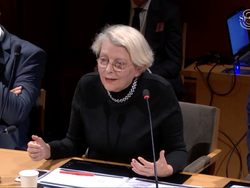
🌐suivre Marie-Anne Frison-Roche sur LinkedIn
🌐s'abonner à la Newsletter MAFR Regulation, Compliance, Law
____

► Référence complète : M.-A. Frison-Roche, "Le juge dans les contentieux de vigilance", participation à la "table ronde sur le devoir de vigilance", audition par la Commission d'enquête du Sénat sur les moyens mobilisés et mobilisables par l'État pour assurer la prise en compte et le respect par le groupe TotalEnergies des obligations climatiques et des orientations de la politique étrangère de la France, 26 février 2024, 16h-17h30
____
____
📺regarder en différé l'ensemble de la table ronde
____
📓lire le rapport de la commission d'enquête du Sénat
____
⚖️ Cette audition a été menée en considération de règles spécifiques à ma situation dans la mesure où d'une part le Droit interdit sous peine de sanction pénale à la personne convoquée de refuser de se présenter et ou d'autre part j'ai immédiatement rappelé au secrétariat de la Commission d'Enquête qu'ayant été Amica Curiae dans le litige opposant les associations Les Amis de la Terre et autres en demande et le groupe TotalEnergie en défense, l'objet du litige portant sur des manquements allégués d'obligations découlant de devoir de vigilance, le statut d'Amica Curiae a conduit pendant cette instance à ne pas connaître le dossier et à continuer de ne pas le connaître pendant une période raisonnable après l'audience du 26 octobre 2022 et le jugement du 28 février 2024 dans le cas dit "Total Ouganda", ce qui conduit nécessairement par application aux règles juridiques et de déontologie à ne pas répondre à certaines questions.
Dans le respect de ces contraintes, il est répondu le mieux possible pour éclairer la Commission d'Enquête.
Cette audition est à mettre en corrélation avec l'audition qui s'est déroulée devant la Commission ... de l'Assemblée Nationale ....
____
► Organisation de la Table Ronde : En accord avec le secrétariat de la Commission d'Enquête, et afin de rendre le plus fructueux possible le premier temps de cette table ronde ayant pour objet Le devoir de vigilance, dans la mesure où il apparaît que dans l'ensemble des auditions programmées, c'est sans doute là où se concentre le plus l'expertise juridique, les 4 intervenants se sont préalablement réunis pour éviter le double écueil soit de traiter deux fois la même chose soit de laisse une dimension du sujet non traité.
Ainsi la première intervenante traite de la façon dont les entreprises élaborent les plans de vigilance, le deuxième intervenant développe la façon dont elles intègrent leur devoir de vigilance dans leur déploiement international, notamment par des mécanismes contractuels, le troisième intervenant expose ce que, dans les contentieux, les demandeurs (qui sont souvent des ONG) allèguent, ce qui m'a conduit en dernier lieu à exposer ce qu'il en est de l'office du juge en la matière.
Il en résulte que mon intervention de 8 minutes aborde plus particulièrement de la question de l'office du juge dans la mise en application du devoir de vigilance.
____
🔲consulter les slides servant de support à cette intervention
____
► Présentation de l'intervention préliminaire : En premier lieu, j'ai souligné qu'en l'état du droit positif, le droit français repose sur le juge puisque la loi pose une Obligation de Vigilance, qui est à la fois une obligation générale et de moyens, l'entreprise devant montrer qu'elle fait ses "meilleurs efforts", cette obligation générale, qui n'est pas limitée à l'environnement, étant déclinée d'une façon particulière par l'entreprise en fonction de ses risques particuliers et de ses engagements propres, notamment contractuels, tandis que le juge applique ce système au cas par cas.
La loi de 2017 a voulu confier ce pouvoir au juge et a voulu un système simple en donnant la seule compétence au seul Tribunal Judiciaire de Paris, ce qui permet d'obtenir une interprétation jurisprudentielle, aussi bien sur les questions procédurales et substantielles, immédiatement unifiée, le dialogue des juges devant être toujours favorisé, tandis que la spécialisation et la formation de ces juges étant un enjeu auquel les juridictions ont répondu concrètement, la Cour d'appel de Paris ayant mis en place une chambre spécialisée, tandis qu'une formation spécialisée sur ces "contentieux systémiques émergents" d'un type nouveau se met en place. Cette spécialisation rend moins impérieuse l'établissement d'une Autorité administrative de supervision.
Cette présence du juge ne doit pas être présentée ni perçue comme pathologique car le procès de vigilance est dans l'ordre des choses, les parties prenantes trouvant une voie d'expression : d'une part plus les entreprises développeront en amont le dialogue et moins il y aura de contentieux et d'autre part le procès lui-même, en continuum, doit favoriser ce dialogue, par le contradictoire et par la médiation.. C'est une part essentielle de l'office du juge qui doit aussi faire respecter le Droit et apporter des solutions à ces enjeux systémiques, la remédiation (plutôt que trancher et sanctionner) étant une voie de son office à développer.
Parce que les juridictions concernées ont su ajuster leur organisation interne et les juges adapter leur office, la généralité de la loi de 2017 permettant précisément cela, la question de l'adoption ou de la non-adoption de la directive CS3D n'étant de ce fait pas un enjeu dramatique parce que le juge est déjà au centre de la vigilance, il convient plutôt de laisser le temps que l'oeuvre de jurisprudence se fasse.
________
Feb. 15, 2024
Publications

🌐follow Marie-Anne Frison-Roche on LinkedIn
🌐subscribe to the Newsletter MAFR Regulation, Compliance, Law
____
► Full Reference: M.-A. Frison-Roche, "Adjusting General Procedural Law to Compliance Law by the Nature of things", in M.-A. Frison-Roche (ed.), Compliance Jurisdictionalisation, Journal of Regulation & Compliance (JoRC) and Bruylant, "Compliance & Regulation" Serie, 2024, pp. 273-28.
____
📝read the article
____
🚧read the bilingual Working Paper which is the basis of this article, with additional developments, technical references and hyperlinks
____
📘read a general presentation of the book, Compliance Jurisdictionalisation, in which this article is published
____
The principal elements of this articles had been presented during the scientific manifestation held on September 23, 2021, at Dauphine University in Paris, coorganised by the Journal of Regulation & Compliance (JoRC) and the Institute Droit Dauphine.
In the book this article is placed in the chapter II about the General Procedural Law in the Compliance Law.
____
► Summary of the article (done by the Journal of regulation & Compliance - JoRC): General Procedural Law is an invention, essentially due to Professor Motulsky, going well beyond the gain that one always has in comparing types of procedures with each other. As he asserted, there is Natural Law in General Procedural Law, in that as soon as there is the Rule of Law Principle there cannot be, whatever the "procedure", even the "process", such and such way of doing things: for example, to decide, to seize the one who decides, to listen before deciding, to contest the one who has decided.
General Procedural Law therefore depends on the nature of things. However, Compliance Law organizes things in a new way. Therefore, both the simple and iron principles of General Procedural Law creep in where we do not expect them at first sight, because there is no judge, this character around whom ordinary procedures fit together. The principles of General Procedural Law are essential in companies. Even if the regulations do not breathe a word about it, it is up to the Judges, in particular the Supreme Courts, to recognize this nature of things because on this effect of nature that General Procedural Law is built: when compliance mechanisms oblige companies to strike, General Procedural law must oblige, even in the silence of the texts, to arm those who can be hit, even stand up against devices that would set aside too much these defenses that are easily considered contrary to efficiency (I).
But because it is a question of making room for this nature of the things of which the Rule of Law Principle entrusts the custody to the Judge and the Lawyer, the General Procedural Law must also adjust itself to what the extraordinary new branch of Law Compliance Law is. Indeed, Compliance Law is extraordinary in that it expresses the political pretention to act now so that the future will not be catastrophic, by detecting and preventing the realization of systemic risks, or even that it is better, by building effective equality or real concern for others. Because it is the Monumental Goals that defines this new branch of Law, a disputed systemic issue, possibly disputed by several parties before a judge, the procedural principles used by the court must be broadened considerably: they must then include civil society and the future (II).
General Procedural Law thus naturally acquires an even more place than in the classic branches of Law since on the one hand it imposes itself outside of trials, particularly in companies and on the other before the courts it involves people who had hardly any place to speak and thinks themselves, especially the systems entering the "causes" of Compliance now debated before the Judge.
________
Feb. 15, 2024
Thesaurus : Doctrine
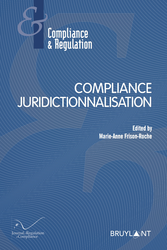
► Full Reference: S. Merabet, "Vigilance, being a judge and not judge", in M.-A. Frison-Roche (ed.), Compliance Jurisdictionalisation, Journal of Regulation & Compliance (JoRC) and Bruylant, "Compliance & Regulation" Serie, 2024, pp. 218-228
____
📘read a general presentation of the book, Compliance Jurisdictionalisation, in which this article is published
____
► Summary of the article:
____
🦉This article is available in full text to those registered for Professor Marie-Anne Frison-Roche's courses
________
Feb. 15, 2024
Thesaurus

► Full Reference: Ch. Lapp, "Compliance in Companies: The Statutes of the Process", in M.-A. Frison-Roche (ed.), Compliance Jurisdictionalisation, Journal of Regulation & Compliance (JoRC) and Bruylant, "Compliance & Regulation" Serie, 2024, pp. 155-166
____
📘read a general presentation of the book, Compliance Jurisdictionalisation, in which this article is published
____
► The summary below describes an article following the colloquium L'entreprise instituée Juge et Procureur d'elle-même par le Droit de la Compliance (The Entreprise instituted Judge and Prosecutor of itself by Compliance Law) , co-organized by the Journal of Regulation & Compliance (JoRC) and the Faculté de Droit Lyon 3. This manifestation was designed under the scientific direction of Marie-Anne Frison-Roche and Jean-Christophe Roda and took place in Lyon on June 23, 2021. During this colloquium, the intervention was shared with Jan-Marc Coulon, who is also a contributor in the book (see the summary of the Jean-Marc Coulon's Article).
In the book, the article will be published in Title I, devoted to: L'entreprise instituée Juge et Procureur d'elle-même par le Droit de la Compliance (The Entreprise instituted Judge and Prosecutor of itself by Compliance Law ).
____
► Summary of the article (done by the Author): The Company is caught in the grip of Compliance Law, the jaws of which are those of Incitement (1) and Sanction that the Company must apply to ensure the effectiveness of its processes to which it is itself subject (2 ).
First, the Company has been delegated to fabricate reprehensible rules that it must apply to itself and to third parties with whom it has dealings. To this end, the Company sets up "processes", that is to say verification and prevention procedures, in order to show that the offenses that it is likely to commit will not happened.
These processes constitute standards of behavior to prevent and avoid that the facts constituting the infringements are not themselves carried out. They are thus one of the elements of Civil Liability Law in its preventive or restorative purposes.
Second, the sanction of non obedience of Compliance processes puts the Company in front of two pitfalls. The first dimension place the company, with regard to its employees and its partners, in the obligation to define processes which also constitute the quasi-jurisdictional resolution of their non-compliance, the company having to reconcile the sanction it pronounces with the fundamental principles of classical Criminal Law, constitutional principles and all fundamental rights. The processes then become the procedural rule.
The second dimension is that the Company is accountable for the effectiveness of the avoidance by its processes of facts constituting infringements. By a reversal of the burden of proof, the Company is then required to prove that its processes are efficient. at least equivalent to the measures defined by laws and regulations, the French Anti-Corruption Agency (Agence Française Anticorruption - AFA), European directives and various communications on legal tools to fight breaches of probity, environmental attacks and current societal concerns. The processes then become the constitutive element, per se, of the infringement.
Thus, in its search for a balance between Prevention and Sanction to which it is itself subject, the Company will not then be tempted to favor the orthodoxy of its processes over the expectations of the Agence Française Anticorruption - AFA , regulators and judges, to the detriment of their efficiency?
In doing so, are we not moving towards an instrumental and conformist Compliance, paradoxically disempowering with regard to the Compliance Monumental Goals of Compliance?
____
🦉This article is available in full text to those registered for Professor Marie-Anne Frison-Roche's courses
________
Feb. 15, 2024
Thesaurus : Doctrine

► Full Reference: D. Latour, "Internal investigations within companies", in M.-A. Frison-Roche (ed.), Compliance Jurisdictionalisation, Journal of Regulation & Compliance (JoRC) and Bruylant, "Compliance & Regulation" Serie, 2024, pp. 184-201
____
📘read a general presentation of the book, Compliance Jurisdictionalisation, in which this article is published
____
► Summary of the article ():
____
🦉This article is available in full text to those registered for Professor Marie-Anne Frison-Roche's courses
________
Nov. 16, 2023
Thesaurus : Doctrine
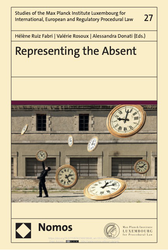
► Référence complète : H. Ruiz Fabri, V. Rosoux et A. Donati (dir.), Representing the Absent, Nomos, coll. "Studies of the Max Planck Institute Luxembourg for International, European and Regulatory Procedural Law", vol. 27, 2023, 496 p.
____
► lire la 4ième de couverture
____
____
► Résumé de l'ouvrage (fait par l'éditeur) : "The ‘absent’ is a notion known in most legal systems. As a legal notion, primarily used in civil law, it refers to one who has left, either temporarily or permanently, their domicile or usual place of residence or business, or whose whereabouts are not known and cannot be ascertained by diligent effort. And yet, the absent may have a family, own a business or property, for whom or which life has to go on. Being absent does not mean having no interest or stake. However, one recurring related issue is determining who can legally speak in the name of, or represent the absent. The book takes root in this idea and widens it by considering the issue of the representation of all those who are not there now, stretching from those who are not there anymore because they have disappeared, to those who are not there yet, because they have not yet appeared. Past and future generations are not only emblematic of both ends of the spectrum but also of the fact that absents can indeed have interests and would therefore need someone to speak in their name/represent them."
(Free translation : "L'absent est une notion connue dans la plupart des systèmes juridiques. En tant que notion juridique, principalement utilisée en droit civil, elle désigne celui qui a quitté, temporairement ou définitivement, son domicile ou son lieu habituel de résidence ou de travail, ou dont le lieu de séjour n'est pas connu et ne peut être déterminé par des efforts diligents. Pourtant, l'absent peut avoir une famille, posséder une entreprise ou un bien, pour lequel ou laquelle la vie doit continuer. Être absent ne signifie pas n'avoir aucun intérêt ou d'enjeu. Cependant, une question récurrente est de savoir qui peut légalement parler au nom de l'absent ou le représenter. Le livre prend racine dans cette idée et l'élargit, en considérant la question de la représentation de tous ceux qui ne sont pas là aujourd'hui, depuis ceux qui ne sont plus là parce qu'ils ont disparu, jusqu'à ceux qui ne sont pas encore là, parce qu'ils ne sont pas encore apparus. Les générations passées et futures ne sont pas seulement emblématiques des deux extrémités du spectre, mais aussi du fait que les absents peuvent en effet avoir des intérêts et auraient donc besoin de quelqu'un pour parler en leur nom/les représenter.")
________
Nov. 9, 2023
Publications

🌐follow Marie-Anne Frison-Roche on LinkedIn
🌐subscribe to the Newsletter MAFR Regulation, Compliance, Law
____
► Full Reference: M.-A. Frison-Roche, "Reinforce the Judge and the Lawyer to impose Compliance Law as a characteristic of the Rule of Law", in M.-A. Frison-Roche (ed.), Compliance Jurisdictionalisation, Journal of Regulation & Compliance (JoRC) and Bruylant, "Compliance & Regulation" Serie, 2024, pp. 39-65
____
📝read the article
____
🚧read the bilingual Working Paper which is the basis of this article, with additional developments, technical references and hyperlinks
____
📘read a general presentation of the book, Compliance Jurisdictionalisation, in which this article is published
____
► This article is the introduction of the book.
► Summary of the article (done by the Journal of Regulation & Compliance): One can understand that the compliance mechanisms are presented with hostility because they seem designed to keep the judge away, whereas there is no Rule of Law without a judge. Solid arguments present compliance techniques as converging towards the uselessness of the judge (I). Certainly, we come across magistrates, and of all kinds, and powerful ones, but that would be a sign of imperfection: its ex-ante logic has been deployed in all its effectiveness, the judge would no longer be required... And the lawyer would disappear so with him...
This perspective of a world without a judge, without a lawyer and ultimately without Law, where algorithms could organize through multiple processes in Ex Ante the obedience of everyone, the "conformity" of all our behaviors with all the regulatory mass that is applicable to us, supposes that this new branch of Law would be defined as the concentration of processes which gives full effectiveness to all the rules, regardless of their content. But supposing that this engineer's dream is even achievable, it is not possible in a democratic and free world to do without judges and lawyers.
Therefore, it is imperative to recognize their contributions to Compliance Law, related and invaluable contributions (II).
First of all, because a pure Ex Ante never existed and even in the time of the Chinese legists📎!footnote-2689, people were still needed to interpret the regulations because a legal order must always be interpreted Ex Post by who must in any case answer the questions posed by the subjects of law, as soon as the political system admits to attributing to them the right to make claims before the Judge. Secondly the Attorney, whose office, although articulated with the Judge's office, is distinct from the latter, both more restricted and broader since he must appear in all cases where the judicial figure puts himself in square, outside the courts. However, Compliance Law has multiplied this since not only, extending Regulatory Law, it entrusts numerous powers to the administrative authorities, but it also transforms companies into judges, in respect of which the attorneys must deal with.
Even more so, Compliance Law only takes its sense from its Monumental Goals📎!footnote-2690. It is in this that this branch of the Law preserves the freedom of human beings, in the digital space where the techniques of compliance protect them from the power of companies by the way that the Compliance Law forces these companies to use their power to protect people. However, firstly, it is the Judges who, in their diversity📎!footnote-2691, impose as a reference the protection of human beings, either as a limit to the power of compliance tools📎!footnote-2692 or as their very purpose. Secondly, the Attorney, again distinguishing himself from the Judge, if necessary, reminds us that all the parties whose interests are involved must be taken into consideration. In an ever more flexible, soft and dialogical Law, everyone presenting himself as the "advocate" of such and such a monumental goal: the Attorney is legitimate to be the first to occupy this place.
________
Sept. 28, 2023
Thesaurus : 01. Conseil constitutionnel
► Référence complète : Conseil constitutionnel, 28 septembre 2023, n° 2023-1062 QPC
____
________
July 6, 2023
Thesaurus : 08. Juridictions du fond
► Référence complète : TJ Paris, 5ème chambre, 2ème section, ordonnance du juge de la mise en état, 6 juillet 2023, n° RG 22/03403, TotalÉnergies
____
____
📝commentaires de la décision :
- Dalloz actualité, 13 juillet 2023, obs. J.-B. Barbièri & A. Touzain
- Rev. sociétés, 2023, p.793, obs. A. Danis-Fatôme & N. Hoffschir
- Gaz. pal., 19 septembre 2023, n° 29, n°GPL453l6, pp. 2-3, note V. Mazeaud
- Bull. Joly, novembre 2023, n° BJS202m8, pp. 17-19, note E. Schlumberger
________

June 21, 2023
Publications

♾️follow Marie-Anne Frison-Roche on LinkedIn
♾️subscribe to the Newsletter MAFR Regulation, Compliance, Law
____
► Full Reference: M.-A. Frison-Roche, Conditions required to promote the "contractualisation" of the Law, Working Paper, June 2023.
____
🎤This Working Paper has been done as a basis for the closing conference of the colloquia La contractualisation du droit. Acte II, organised by the Société de législation comparée (SLC) and the Procuradoria Geral do Estado do Rio de Janeiro (PGE-RJ), on 19, 20 and 21 June 2023.
____
📝It is also the basis of the article "Les conditions requises pour favoriser la "contractualisation" du droit" ("Conditions required to promote the "contractualisation" of Law"), published in the book 📗La contractualisation du droit. Approches françaises et brésiliennes (Contractualisation of Law. French and Brazilian approaches).
____
► English Summary of the Working Paper :
____
🔓read the Working Paper⤵️
June 21, 2023
Conferences
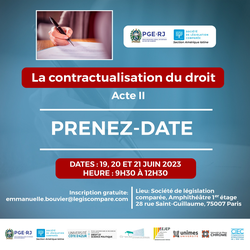
♾️follow Marie-Anne Frison-Roche on LinkedIn
♾️subscribe to the Newsletter MAFR Regulation, Compliance, Law
____
► Full Reference: M.-A. Frison-Roche, "Favoriser ou pas la « contractualisation » du Droit" ("To favour or not the "contractualisation" of the Law"), final speech in Société de législation comparée (SLC) and Procuradoria Geral do Estado do Rio de Janeiro (PGE-RJ), La contractualisation du droit. Acte II, Paris, 21 June 2023.
____
🧮See the full programme of this event (in French).
The conference is held in French
________